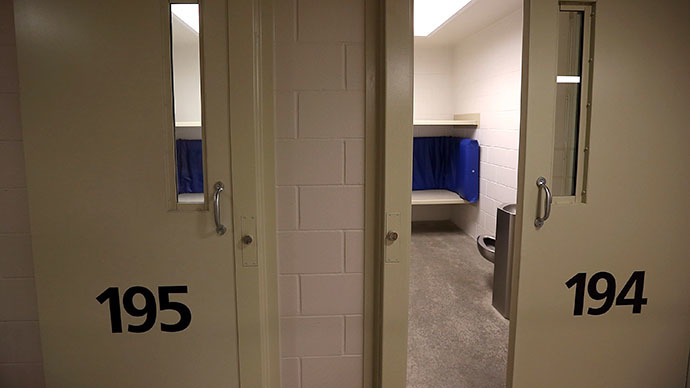Colorado regularly imprisons poor offenders unable to pay fines – ACLU

Jails in multiple cities throughout Colorado regularly imprison people who were previously given a fine by a court but are simply too poor to pay it, according to a new report from the American Civil Liberties Union that calls for an end to this practice.
The ACLU conducted investigations in municipal courts of Westminster, Wheat Ridge, and Northglenn, Colorado – all of which are located just outside Denver – and found that each of the cities regularly hand out “pay or serve” warrants that lock up those who cannot foot the bill.
One of the subjects was Linda Roberts, a 55-year-old grandmother who struggles with a disability and survives on food stamps. She was arrested in June 2012, according to the ACLU, for stealing $20 worth of groceries. Upon pleading guilty, she was ordered to pay a $371 fine, which was then raised to a $746 fine when she did not pay the initial amount.
Ms. Roberts was arrested in October of that year and served 15 days in the county jail. She now maintains that, during her stint behind bars, she appeared in front of a court and was forced to serve the duration of the 15 days unless she could pay the fine.
Roberts’ story and others like it come after a number of recent ACLU investigations found similar circumstances at prisons in Ohio, Georgia, and Alabama. Yet the practice has been illegal since the 1830s, and a Supreme Court ruling from 1983 upheld that “a sentencing court cannot properly revoke a defendant’s probation for failure to pay a fine and make restitution…”
Part of the motivation to keep this practice alive in some states is the growing influence of private prison firms, which always need inmates in their facilities in order to earn a profit. Yet this does not seem to be done for the benefit of the taxpayer.
A facility in Jefferson County, Colorado, for example, was found to be holding individuals who owed a total of $50, but the cost to keep them behind bars was $70 a day. Linda Roberts’ time in custody cost the government $1,700. Over a five month span taxpayers in Jefferson County alone paid $110,000 to keep poor people in jail, according to the ACLU.
CBS reported earlier this year that as many as one-third of states in the US are estimated to have facilities that stand in violation of the 1983 Supreme Court decision. Another way this happens is in so-called mayors’ courts, an Ohio tradition that grants town mayors the ability to administer the law even without being an attorney or even having a degree. Jack Dawley, an unemployed Ohio man, explained what the process was like for him during an interview earlier this year.
“They didn’t give you the opportunity to say you couldn’t pay,” he said. “They just gave out 10 day sentences…There was nothing about your finances. Either you plead guilty, not guilty or no contest. They give you a jail date and put you on a payment plan, and if you don’t make the payment plan you’re going to jail.”














